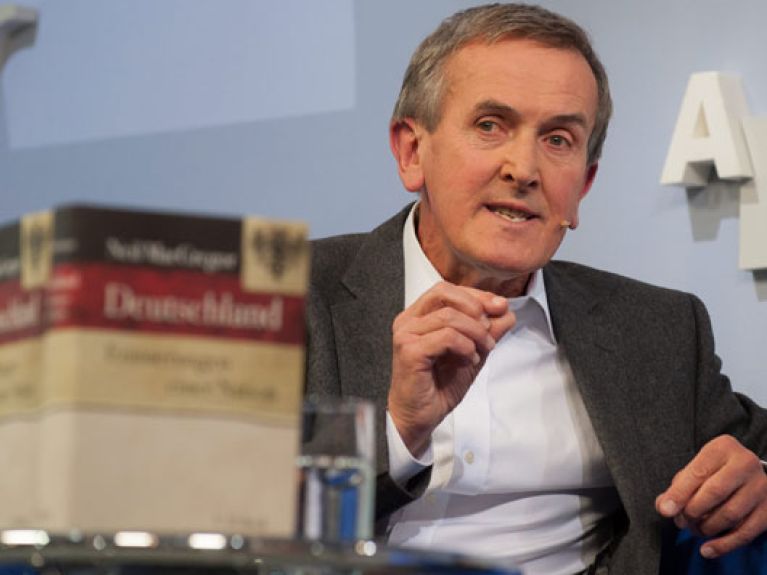Respected narrator of German history
Neil MacGregor’s view from outside has enriched the debate on Germany’s past and Germany’s memories. An interview on his highly acclaimed exhibition and his new book.

Your exhibition “Germany: memories of a nation” at the British Museum was extremely successful. Now the accompanying book has also been published in German. What was the underlying idea?
To broaden the British people’s dramatically blinkered picture of Germany in the 20th century, and to counteract the way the portrayal of Germany in schools and universities has been restricted to the First World War and the Nazi regime, describing the country as an aggressive, militaristic enemy. Our argument was that the nation created in 1991 was a Germany that had never existed in this form before. We wanted to ask what the people living within the new borders had in common – irrespective of whether they came from the GDR or the old Federal Republic. It was about the memories that hold this new country together.
Have you succeeded in broadening the British view of Germany?
The response has exceeded all expectations. The accompanying BBC radio programme attracted three to four million people every day, and the exhibition was sold out. The public realized that their image of Germany was outdated and inadequate. Our project has had a big influence on the way the British think about Germany. Exhibition visitors, listeners and readers admitted that they had not understood many aspects before: the constantly changing borders, the phenomenon of displaced people after 1945, the effect on regional identity of the long-standing fragmentation as a result of the federal system. The British public were now more aware of these questions – questions that are self-evident for every German and contradict the picture of a state militarised in the First World War and Nazified in the Second World War.
How would you describe the way the Germans reacted to your project?
I was surprised by the reaction because I thought the Germans would regard the choice of topics as banal. I was astonished at how much easier it is for a German narrator than for a non-German to tell stories about Germany’s past – to be able to speak about Königsberg, Strassburg and Prague as cities that have played an enormous role in German cultural life even though they are now no longer in Germany. Another aspect is that the book is made up of memory fragments. The history is not presented as a straight-line development inevitably leading to the murderous criminality of the Holocaust. This approach made a different perspective possible. Although the horrors are the central memories through which the past is seen, they are not the only memory and they are not what the whole story leads up to. I found it striking how much the Germans have lost track of their deeper and older past as a result of the responsibility for the crimes of the Hitler period. It surprised me to hear from Germans how much they had learned from the material in the book, which I had believed everyone would know from school.
Some people would object – as they have against Christopher Clark’s “Sleepwalkers” – that you offer the Germans too cosy a version of their history, that you let them get off scot-free.
I would argue that the book contains many things that are extremely uncomfortable. The extent to which German history has been poisoned by the experience of Nazism is unavoidably recognisable in almost every chapter. This has to be explained to foreigners. Our initial target audience was British. The British have a very comfortable picture of their history. It’s difficult for them to understand that hardly a single aspect of Germany’s past has remained untouched by the poison of the Hitler era. I don’t think the book lets the Germans get off scot-free. It articulates the fundamental truth that memories are dominated by the joint responsibility for the greatest crime. This is not the only memory. Of course, the memories of the Hitler period are defining memories, but there are also other memories that must be taken into consideration.
The question “What is Germany?” is asked in the middle of the book. As the first artistic director of the Humboldt Forum in Berlin, you will be concerned with German identity in the wider context of world cultures. What ideas has your work on this book given you for this task?
Our primary aim with the exhibition was to make the point that, unlike in Britain or France, it’s impossible to talk about one history in the case of Germany. What consistently binds Germany together, despite the different historical developments of its parts, is the language. This binding force could be an interesting approach to thinking about world cultures and the question of how to portray material culture and memories from other countries. After all, one aspect of identity is how one sees one’s position in the world.
You conclude your book with Gerhard Richter’s portrait of his daughter Betty with her face turned away. You observe that “in a moment this young woman will turn to face us, and the future”. When you wrote that, Angela Merkel had not yet opened the door to the refugees. What kind of future will Betty see?
In the “Memories of a nation” we highlighted the history of displaced persons after World War II. The British were not aware that Germany is a country where almost every family has memories of what it’s like to be a displaced person. Of course, this experience impacts on the German perspective of the current situation and the ethical issues that must be tackled in the context of every political debate. Every country affected sees the European refugee crisis as an internal political problem. Only the Federal Republic has perceived it as a moral challenge to the principles on which the European civilisation is based. This is a result of Germany’s way of dealing with the past, present and future, which has been influenced by history. We know that Richter’s Betty is looking at her father’s work and is about to turn around. What she will see when she turns to look forward again is an attempt to bring moral principles into harmony with the complexity and feasibility of politics. ▪

